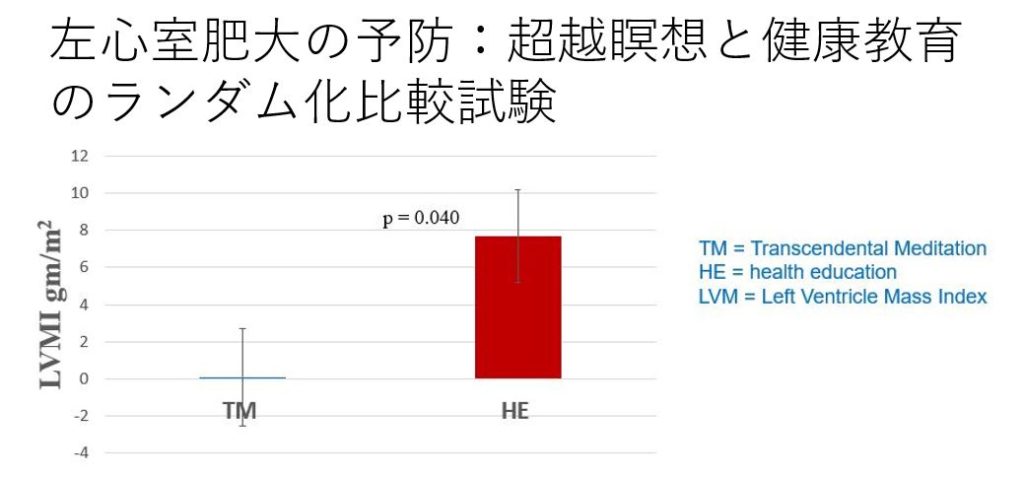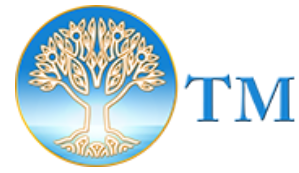
参照: シュナイダー、R.H.、マイヤーズ、H.F.、マルワハ、K.、レインフォース、M.A.、サレルノ、J.W.、ニディッチ、S.I.、… ノリス、K.C.(2019). 左心室肥大の予防におけるストレス軽減:高血圧のアフリカ系アメリカ人における超越瞑想と健康教育のランダム化比較試験。 人種および疾病、29(4)、577-586.
50歳の高血圧患者に関するこの研究では、同じ期間に心臓が拡大した健康教育プログラムの対照群と比較して、6か月のTM実践により心臓が肥大するのを防ぐことがわかりました(左心室肥大と呼ばれます) 。
背景:アフリカ系アメリカ人の心血管疾患(CVD)の割合は不均衡に高い。左心室肥大(LVH)はCVDの独立した危険因子であり、この格差に寄与する可能性があります。心理的ストレスは、アフリカ系アメリカ人や他の人々のLVHに寄与しています。
目的:この研究では、高血圧を有するアフリカ系アメリカ人成人のLVHの予防に対する超越瞑想(TM)技術によるストレス軽減の効果を評価しました。
セッティング:マーティンルーサーキング病院-チャールズR.ドリュー医科学大学、ロサンゼルス、CA
方法:この試験では、85人のアフリカ系アメリカ人成人(平均52.8歳)がTMプログラムまたは健康教育(HE)コントロールグループのいずれかにランダムに割り当てられ、ポストテストが完了しました。参加者は、Mモード心エコー、血圧、心理社会的ストレス、行動因子により、ベースライン時および左室質量指数(LVMI)について6か月後にテストされました。アウトカムの変化は、ANCOVAによりグループ間で、ペアt検定によりグループ内で分析されました。
結果:TM群はHE群と比較してLVMIが有意に低かった
(-7.55gm / m2、95%CI -14.78から-.34 gm / m2、P = .040)。両方の介入は、グループ内でBPの有意な減少を示した(TMのSBP / DBPの変化:-5 / -3 mm Hg、HEの場合:-7 / -6 mm Hg、P = .028から<.001)変更は重要ではありませんでした。さらに、両方のグループが怒りの大幅な減少を示しました(P = .002から.001)。ライフスタイル要因に他の変化はありませんでした。
This study of 50-year old hypertension patients found that six months of TM practice prevented their hearts from becoming enlarged (called left-ventricular hypertrophy), compared to the control group in a health education program, whose hearts did enlarge over the same time period.
Background: African Americans have disproportionately high rates of cardiovascular disease (CVD). Left ventricular hypertrophy (LVH) is an independent risk factor for CVD and may contribute to this disparity. Psychological stress contributes to LVH in African Americans and other populations.
Objective: This study evaluated the effects of stress reduction with the Transcendental Meditation (TM) technique on preventing LVH in African American adults with hypertension.
Setting: Martin Luther King Hospital – Charles R. Drew University of Medicine and Science, Los Angeles, CA.
Method: In this trial, 85 African American adults (average 52.8 years) were randomly assigned to either TM program or health education (HE) control group and completed posttesting. Participants were tested at baseline and after six months for left ventricular mass index (LVMI) by M-mode echocardiography, blood pressure, psychosocial stress and behavioral factors. Change in outcomes was analyzed between groups by ANCOVA and within groups by paired t-test.
Results: The TM group had significantly lower LVMI compared with the HE group
(-7.55gm/m2, 95% CI -14.78 to -.34 gm/m2, P=.040). Both interventions showed significant within group reductions in BP, (SBP/ DBP changes for TM: -5/ -3 mm Hg, and for HE: -7/-6 mm Hg, P=.028 to <.001) although between group changes were not significant. In addition, both groups showed significant reductions in anger (P=.002 to .001). There were no other changes in lifestyle factors.




